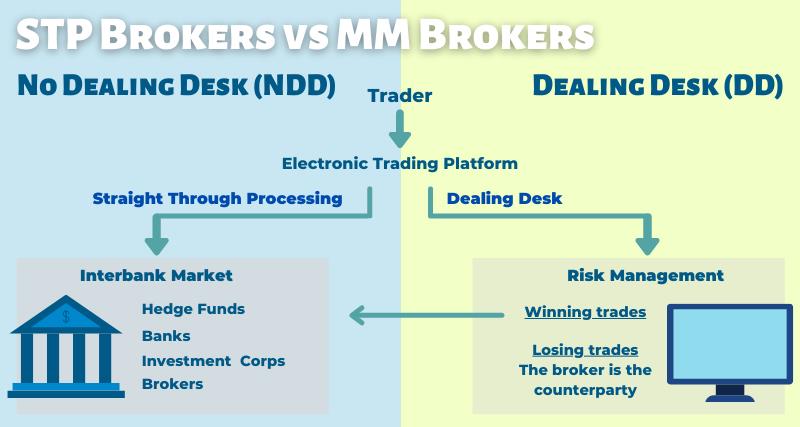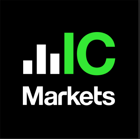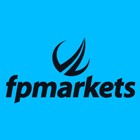ベストSTP外国為替ブローカー 2026 | STP Forex Brokers
| ブローカー | レビューを投稿する | フォーラム投稿 | 規制 | ユーザー レーティング | 価格のレーティング | 最低入金額 | 最大リバレージ | 資金調達方法 | トレードプラットフォーム | セントアカウント | 赤字残高に対する保護 | 規制機関による預金保険 | 資産の区分 | 言語 | 1326af00-f0ac-49c6-9038-c76f23ca1598 |
|---|
There are several execution models brokers for online forex trading. Understanding the difference between one model and another can be difficult, due to the so many acronyms used. You probably saw some claiming to be STP forex brokers, whilst others advertise themselves as NDD forex brokers.
In economics, the term broker refers to an intermediary. It can be an individual or a brokerage company. Their function, in both cases, is mediating transactions between a buyer and a seller. For that, they earn a commission when the deal is done. For retail traders, to choose the right broker, it is essential to know and be aware, of how the various types of brokers operate in the online CFD trading industry.
The fundamental difference between online forex brokers is whether they operate with an NDD (No Dealing Desk) or with a DD (Dealing Desk) model. In retail forex trading, fairness must always be maintained. Thus, it is important to understand who the counterparty is when taking a trade.
DD - Dealing Desk (or Market Makers)
Market Makers operate through the Dealing Desk model and quote fixed spreads on their trading platforms. As the denomination implies, they make the market.
A forex CFDs DD broker makes money in two ways: with the quoted spreads and by trading against clients. Market Makers do not provide access to the FX Interbank market. Instead, traders will be trading on the broker’s pool of liquidity.
A trader will not see the real market quotes, which can allow the Dealing Desk broker to manipulate the quotes to profit from the market volatility. Or even from tight stop-losses (often called stop-loss hunt).
When trading with an MM broker, the trader's counterparty will always be the broker. So, for every position opened, the broker will open a counter trade. These trades will always be on the opposite side of the trader, to cover the broker’s exposure.
As the majority of traders, especially novice traders operating with under-capitalised and over-leveraged trading accounts, lose their account balances, the MM broker (the counterparty), benefit from it and makes a profit for every loss taken by the trader.
NDD - No Dealing Desk

An NDD forex broker is a broker that provides direct access to the Interbank market (the foreign currency exchange), without passing client’s orders through the Dealing Desk, or without requotes to the retail client.
An NDD broker makes money, also, in two ways: by offering an attractive spread and by charging a trading commission, or, by increasing spreads and setting the trading commissions to zero.
With a true No Dealing Desk broker there are no requotes on orders, but price slippage is very common. This event is due to the highly volatile nature of the forex market. This, in particular, can be reflected when the release of high-impact news occurs and price quotes can surge, or plummet, tenths of pips in just a matter of seconds. This will result in opening or closing limit and stop orders at a better, or worse, price.
The advantages of trading via a No Dealing Desk broker are several for retail traders. Three benefits stand out when compared to other execution types.
Firstly, anonymity. Client orders are executed automatically, instantly and anonymously. There are no Dealing Desks monitoring clients’ orders. All orders are routed directly to the LPs (liquidity providers).
Secondly, trade transparency. Traders know, and will be confident, that their orders are sent straight to the real market - and not to the broker’s pool of liquidity.
The third main advantage is better and faster order fills. All the participants, including the liquidity providers, compete for the best prices in the real market. No re-quotes are made and there is no additional interruption to order confirmation.
STP - Straight Through Processing Brokers
The STP forex brokers send the orders directly from clients to liquidity providers. A few STP brokers examples can be the Deutsche Bank or the Citigroup, important players in the Interbank market. STP brokers can have only one major liquidity provider, or be connected to several providers. Very often they are connected to, not just banks, but also hedge funds, investment corporations, even other forex brokers.
The more banks and liquidity providers there are in the system, the better the execution for clients. The fact that traders have direct access to the real market, and can execute trades without the intervention of the broker, makes the STP platform attractive to retail investors, as the counterparties are the main market players.
STP brokers earn money through a small spread markup, added on the best bid and ask rates obtained directly from the liquidity providers. For example, an STP broker can add 0.5 pip to the best bid price or subtract 0.5 pip from the best ask price from their liquidity providers.
- STP forex brokers do not trade against clients.
- Access to real-time market quotes.
- No Dealing Desk. Client's orders are sent directly to liquidity providers.
- Access to better liquidity providers. Thus, better order filling for clients.
STP brokers with fixed spreads will not adjust spreads based on the bid and ask prices offered by their LPs. The fixed spreads they charge are higher than the best quotes they obtain from the liquidity providers.
Fixed spread STP brokers may use their back-office pricing system to ensure that they profit from the difference in spreads, while simultaneously, choosing to hedge risk with better rates on transactions with the liquidity providers.
Other online forex brokers are classified as DMA forex brokers. Slightly different from the STP format, DMA trading can be offered in different ways. For example, brokers often contract with various banks, and other LPs, to secure access to the best possible market rates.
DMA - Direct Market Access
DMA (Direct Market Access) in retail forex trading, refers to the electronic means of matching a broker's trade orders with the price quoted by the market participants. It allows retail investors to trade in a transparent and low-latency environment.
As the term implies, with the Direct Market Access execution, all the orders will flow directly to the other market participants. This includes liquidity providers (banks, hedge funds, etc.) and other market players (investment firms, market makers, other brokers, etc.).
Normally, the execution type of DMA is market price only. The trade orders go to the market and filling is done based on the available quotes given by the liquidity providers. The DMA brokers add a small markup to the quotes to make a profit.
DMA brokers might also own the DMA platform offered to the trader. Whilst the STP broker passes the order directly to the market, the DMA broker simply facilitates access to the market on the DMA platform it provides to clients.
The DMA trading platforms set a fixed spread markup on the client's transaction prices and/or charge a trading commission. One great feature of some DMA platforms is the access to the Depth of Market (DOM) order book, allowing traders to see where the “smart money” is positioned.
NDD & DD Hybrid Forex Brokers
We live in an era dominated by the constant need to find global alternatives and solutions for avid consumers. And the retail forex trading industry is no exception. Currencies trading, the largest and most liquid market globally, that once was reserved to only rich players with millions of dollars to trade, is now open to anyone to speculate, from as little as US$ 10.
The online brokers, aware of the large increase in retail forex trading, have found an interesting solution to cater for even more retail investors. The hybrid model, a combination of NDD & DD execution models.
The real forex market is a battleground for investors and traders with big money. The minimum trade size accepted is 0.10, or 1 mini-lot of 10,000 currency units, considering that 1 standard lot in forex is 100,000 currency units. For example, a bank opening a 1 lot EUR/USD buy trade is selling 100,000 Euro and buying the US Dollar at the exchange rate. And that is a lot of money for retail traders...
Retail traders do not have such “fire-power”. With a retail broker offering to trade on leveraged CFD products, it becomes much easier. And the other feature made available by brokers to retail investors is access to the market with much smaller investments, or, trading lots. This offer is marketed to retail traders as trading accounts with low deposits and micro-lots or cent accounts.
Many retail brokers offer this hybrid business option, combining trading accounts using an NDD STP, or ECN execution type, and trading accounts processed via Dealing Desks. Traders can select the one they prefer (most of the time inadvertently) depending on their initial trading capital.
- If an ECN/STP forex broker is offering Cent or Mini Accounts, it usually means that it has an operating Dealing Desk.
This is because all the small orders placed by traders, or trading lots below 0.10 (10,000 currency units), cannot be sent to the LPs, as they do not accept orders that are too small, by contract.
Final Considerations
Brokers operating through Dealing Desks, or Market Maker, make money on the spreads and losses of their client's trades. Opposite, a surge in the number of winning traders, will increase the operational risk of a Dealing Desk broker.
There is no more transparent figure than the No Dealing Desk broker. This type of broker, because it does not profit from losses, wants clients to win trades, to earn money, and the more trades clients take, the more profit the broker makes (through commissions or small markups on spreads).
Not all forex brokers will be honest with you. This is why, whether you choose an ECN broker, STP broker, or even a Market Maker, it is important to choose a broker strongly regulated and with a good reputation for your trading adventure.
On our STP Forex Brokers list, you can check out each broker's regulations and pricing ratings. You can also compare the user rating of each broker, by verified traders, to find out how they rate them for their trading conditions and services.








